Reviews
Mitchell Leisen
USA, 1940
Credits
Review by Lindsay Peters
Posted on 01 March 2011
Source YouTube
Categories Brackett & Wilder
Arise, My Love began as a prefabricated contract assignment for Wilder and Brackett. According to Wilder, the pair were called into Paramount and instructed to write a script about an imprisoned pilot, and to include a leading part for Claudette Colbert, who was already attached to star. The end result finds Colbert as aspiring star reporter Augusta (“Gusto”) Nash, who infiltrates a Spanish prison to rescue Ray Milland’s Tom Martin, an idealistic American pilot about to be executed for his role in the Spanish Civil War.
Colbert and Milland are ripe for romantic entanglement right from the start. In a classic maneuver of Wilderian masquerade, Colbert spirits Milland out of prison by pretending to be his wife, setting the stage for Milland’s flirtatious mid-air advances while the pair evade the Spanish authorities in a stolen government plane. Political idealism and professional duty provide the obstacles to romance in this wartime comedy; thankfully, however, the leads don’t protest too much when their mutual attraction momentarily gets the better of their personal ambitions. Separated by the declaration of war throughout Europe, Gusto and Tom realize that social responsibility must trump their dream of a life together in an America still untouched by war. After succeeding on the frontlines of the war effort on the page and in the air, Gusto and Tom find each other at the end of the film and renew their devotion to each other and their dedication to the fight against Hitler. Such an ending borders on didactic patriotism intended for a pre-war American audience; however, the deftness of Brackett and Wilder’s screenplay and the unwavering chemistry between Colbert and Milland prevent the film from descending completely into wartime propaganda.
Paramount subsequently gave Brackett and Wilder’s script to director Mitchell Leisen, who had just come off the Brackett-Wilder-Colbert smash Midnight (1939). A former art director and costume designer, Leisen became well known as a director of frothy romantic comedies throughout the 1930s and 40s. Arise, My Love is an interesting anomaly in Leisen’s career: his predilection for lavishly decorated sets and art deco sensibility was curtailed by the film’s relatively austere wartime setting. Dismissed by Wilder as little more than a window dresser, today Leisen is largely ignored as a Hollywood auteur despite his distinctive attention to set design and background detail.
Arise, My Love is also an interesting antidote to other early wartime romantic comedies like Leo McCarey’s now-tactless Once Upon a Honeymoon (in which Cary Grant and Ginger Rogers fail to let any of the atrocities they encounter dampen their spirits for very long as they make their way through war-torn Europe.) In contrast, Brackett and Wilder’s script provides an objective perspective on the increasingly bleak European situation in the form of a hapless editor played by Walter Abel, a welcome foil to Colbert’s lovelorn reporter.
Including Arise, My Love, Colbert and Milland share a total of five Brackett/Wilder credits to their inestimable names—Colbert with Bluebeard’s Eighth Wife and Midnight; Milland with The Major and the Minor and The Lost Weekend . It’s easy to see why both actors were ideal choices for the comedic refinement that defined the Brackett/Wilder style: Colbert’s accessible sophistication makes for an ideal pairing with Brackett and Wilder’s effortlessly searing quips and elegant expositional techniques; Milland combines Jimmy Stewart’s wry humour and Cary Grant’s lilting cadence with Gregory Peck’s unyielding decency to create a slyly affable romantic hero more than capable of taking on Brackett and Wilder’s high-speed wordplay.
In addition to wartime comedy, Arise, My Love can also be categorized within the girl reporter subgenre of the newspaper film. The film was released the same year as Howard Hawks’ seminal His Girl Friday, a story Wilder would later adapt for his 1974 version of The Front Page. In contrast to Rosalind Russell’s Hildy Johnson, who effortlessly commands a gender-neutral place of respect within the boys-club newsroom, Colbert’s Gusto Nash uses her feminine wiles to secure the trust of a Spanish governor, the freedom of an imprisoned pilot, and, in turn, a promotion to special Berlin correspondent. The casual misogyny that runs throughout Arise, My Love further divides the two films—on the eve of war, Abel’s understandably apoplectic Mr. Phillips wonders if an absentee Gusto “thinks that Hitler is waiting while she gets a permanent wave.” Such a statement would never be uttered anywhere near Hildy Johnson, a detail admittedly aided by the fact that the role was originally written for a man. While Friday’s Hildy Johnson remains an admirable feminist icon for the workplace, Gusto Nash is perhaps a more realistic portrayal of the ideal 1940s newspaperwoman; in the end she succeeds despite her editor’s misogynistic jabs, and gets her man too.
Arise, My Love remains the more obscure of the two films in part because the wartime setting forces larger responsibilities upon Brackett and Wilder’s script, and ultimately obliges the filmmakers to emphasize action over dialogue. Had the film retained the situational tautness of Midnight and the verbal energy of Bluebeard’s Eighth Wife, perhaps Arise, My Love would now be as readily embraced as His Girl Friday, or at least available on DVD this side of the ocean.
More Brackett & Wilder
-
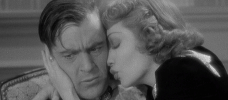
Bluebeard’s Eighth Wife
1938 -
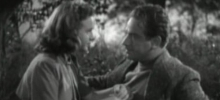
That Certain Age
1938 -

Midnight
1939 -
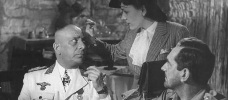
Five Graves to Cairo
1943 -
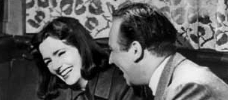
Ninotchka
1939 -
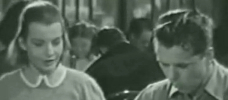
What a Life
1939 -
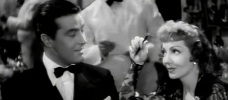
Arise My Love
1940 -
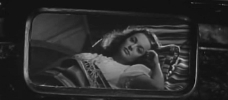
Hold Back the Dawn
1941 -
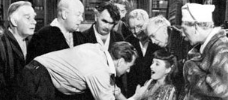
Ball of Fire
1941 -
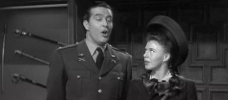
The Major and the Minor
1942 -
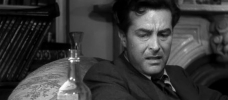
The Lost Weekend
1945 -
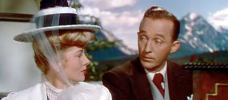
The Emperor Waltz
1948 -
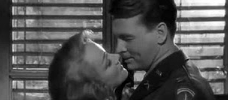
A Foreign Affair
1948 -
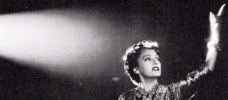
Sunset Boulevard
1950
We don’t do comments anymore, but you may contact us here or find us on Twitter or Facebook.



